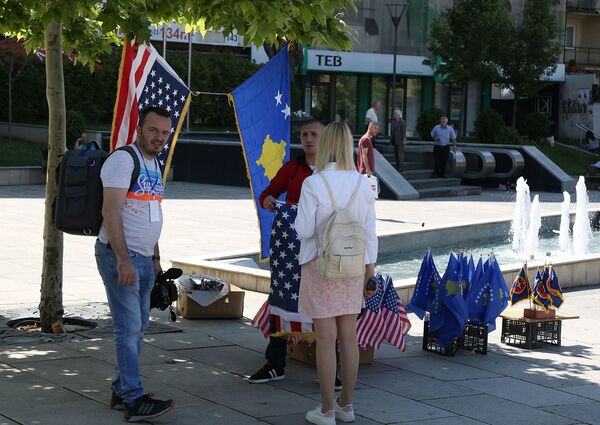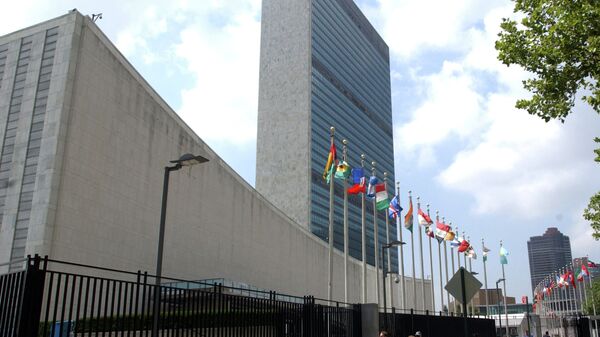"If bilateral talks fail [to settle the problem], we need to engage a third party who will manage to skirt contentious issues. Russia could become a potential third party to the negotiations [between Serbia and Kosovo]," Mr Chepa stressed.
The negotiations between Serbia-Kosovo have been led by Brussels for eight years, but according to Dragana Trifkovic, head of the Belgrade-based Center for Geostrategic Studies, are unconstitutional, as the West is trying to impose a solution in violation of international law.
"The EU-led talks on resolving the Kosovo problem have produced no positive results and, in particular, no results that could contribute to a lasting peace between Serbs and Albanians in Kosovo and Metohija," Mrs Trifkovic said.
"The only regular international legal basis for resolving the Kosovo issue is the UNSCR (UN Security Council resolution) 1244," she explained. Resolution 1244, adopted in 1999, authorised an international peacekeeping force in Kosovo and established the United Nations Interim Administration Mission there (UNMIK) after the NATO war on Yugoslavia (1999).
“For this reason, it is necessary to find a new format for discussing the Kosovo problem at the UN, where Russia would also act as a mediator. Russian representatives at the UN are making great efforts to understand and present the real situation in Kosovo and Metohia throughout the whole world,” Mrs. Trifkovic said.
Srdja Trifkovic, a Serbian-American writer on international affairs and foreign affairs editor for Chronicles magazine believes that there are no preconditions for talks between Serbia and Kosovo, so no one should be mediating any negotiations.
“[...] Even that phrase - Serbia and Kosovo - is wrong - because it presupposes that we are looking at two different entities. Serbia is effectively not in control of Kosovo, but Kosovo is an integral part of Serbia,” Mr Trifkovic noted.
The authorities of the breakaway Serbian province wouldn’t want Moscow to play the role of a mediator because they know it doesn’t recognise its independence, the international relations expert said.
"The Albanians in Kosovo, or rather the temporary institutions that the Albanians proclaimed as an independent state in 2000, that they illegally and in violation of the Security Council Resolution 1244, that entity does not want Russia to interfere in any way - because they feel they are totally supported by both the European Union and the United States and that Russia is supportive of Serbia."
The Role of the United States
The United States Special Representative for the Western Balkans Matthew Palmer visited Kosovo last week reaffirming that finding a solution to the Kosovo-Serbia relationship is a “US strategic priority.”
"Resolving once and for all the relationship between Kosovo and Serbia through full normalisation remains a US strategic priority, one that will have an enormous impact on the people and the broader region," Palmer said in his speech in Pristina on Friday.
Washington has intensified its efforts to restart stalled negotiations between the two Balkan rivals, with US President Donald Trump also appointing Ambassador Richard Grenell as Special Presidential Envoy for Serbia and Kosovo Dialogue last month.
But the US says it wants more than just a normalisation of dialogue, it also wants Kosovo and all of the Western Balkan nations to join NATO and the EU. However, some European countries, such as France, insist that the bloc is not ready to accept new members any time soon.

Krenar Shala, a political analyst based in Kosovo, noted that the lack of unity among Euro-Atlantic members on the issue is only contributing to the already difficult situation.
"This disunity has created a climate of impasse," the political analyst explained. "With this ambiguous situation in place, I believe that resolving the issue between Kosovo and Serbia will further deteriorate, albeit the ever-increasing pressure by the EU and the US to make the necessary compromise in order to solve it," Mr Shala said.
He added that Brussels’ failure to make progress has led to Washington increasing its role in the Kosovo-Serbia issue.
According to Dragana Trifkovic, the US wants to take over the initiative from the EU to resolve the Kosovo issue, so the time has now come for Russia to step in.
Srdja Trifkovic, on the contrary, believes that the authorities of the breakaway Serbian province wouldn’t want Moscow to play the role of a mediator because it doesn’t recognise its independence, and the US will do everything they can to prevent Russia from taking part in these talks.
“It is totally unimaginable that the United States would be willing to allow the Russian Federation to step in any negotiating capacity, considering the self-confidence and even arrogant way in which Washington sees itself as the only arbiter of Kosovo's future and where the European Union in Brussels is simply toeing the line,” he said.
Nevertheless, Russia should still support Serbia in its refusal to be pressured into recognising Kosovo's independence, but without playing a mediating role, Mr Trifkovic argued.
But at the same time, the US can’t be the only power imposing its own solutions, Dragana Trifkovic said, and Russia can be a stabilising factor for the Balkans.
"Especially when we consider the American role in the 1999 bombing of Serbia, which created the conditions for the realisation of the separatist plans of the Albanians," the head of the Belgrade-based Center for Geostrategic Studies concluded.
Stalled Talks Between Serbia, Kosovo
Kosovo unilaterally proclaimed independence from Serbia in 2008 - a move that Belgrade rejected. Russia, China, and five EU countries - Spain, Slovakia, Cyprus, Greece and Romania - have also refused to recognise Kosovo's independence.
In 2011, Belgrade and Pristina engaged in EU-facilitated talks with the aim of normalising relations between the partially recognised state and Serbia, but the negotiations have been complicated.
The 2013 Brussels Agreement on normalising relations and the 2015 accord on forming the Community of Serb Municipalities, a self-governing association of the Serb-dominated regions of Kosovo, have been the consultations' main results so far.
The EU-brokered talks have remained stalled over the past years, while the relationship between Serbia and Kosovo remains tense.
In November last year, authorities in Kosovo introduced a 100% tariff on imports from Serbia in retaliation for Belgrade blocking Kosovo's membership in international organisations and its campaign to get countries to revoke their recognition of the breakaway province.
While over 100 UN member states recognise Kosovo’s independence, more than 10 countries formally revoked their recognition.
In December 2018 Pristina's parliament voted to transform Kosovo’s existing security force [Kosovo Security Force] into a fully-fledged army. The move has drawn heavy criticism from Belgrade, which called it illegal and a violation of the UN Security Council resolutions



